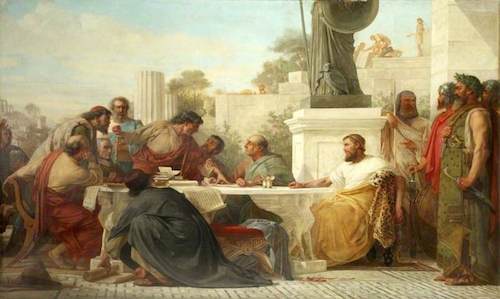 If the Church were to compile a list of its least favorite people throughout history, one of the highest places would be reserved for a 4th century Roman emperor named Julian, who is commonly known as “Julian the Apostate.” (An apostate is a Christian who abandons or betrays his or her faith.) Julian was born after Christianity had been legalized, and he was baptized and raised a Catholic himself, but he turned against the Church and rejected its teachings. When Julian became emperor in the year 360, he tried to restore paganism and restrict Christianity. He sacrificed to pagan gods, publicly scorned the Church, turned churches into pagan temples, and did everything possible to oppose followers of Christ. In his arrogance, Julian even tried to undo the destruction of the Temple in Jerusalem, simply because Jesus had foretold that event and announced that not one stone would be left standing upon another. As Jesus predicted, the Temple was destroyed in the year 70AD during the Jews’ unsuccessful revolt against the Romans; almost 300 years later Julian ordered the Temple rebuilt so as to make a liar out of Jesus. However, the project was doomed to failure. After some of the walls were raised, an earthquake destroyed them. When new walls were again constructed, another earthquake made them collapse, killing some of the workmen in the process. The emperor demanded the work resume, but to no avail, for in the words of a pagan historian of the time, “fearful balls of fire burst forth from the earth close to the foundation, scorched the workmen, and made it impossible to get near the place” (Tonne, Five-Minute Homilies, p. 171). When Julian died in battle against the Persians soon after this, Christians rejoiced that God had delivered them from their enemy.
If the Church were to compile a list of its least favorite people throughout history, one of the highest places would be reserved for a 4th century Roman emperor named Julian, who is commonly known as “Julian the Apostate.” (An apostate is a Christian who abandons or betrays his or her faith.) Julian was born after Christianity had been legalized, and he was baptized and raised a Catholic himself, but he turned against the Church and rejected its teachings. When Julian became emperor in the year 360, he tried to restore paganism and restrict Christianity. He sacrificed to pagan gods, publicly scorned the Church, turned churches into pagan temples, and did everything possible to oppose followers of Christ. In his arrogance, Julian even tried to undo the destruction of the Temple in Jerusalem, simply because Jesus had foretold that event and announced that not one stone would be left standing upon another. As Jesus predicted, the Temple was destroyed in the year 70AD during the Jews’ unsuccessful revolt against the Romans; almost 300 years later Julian ordered the Temple rebuilt so as to make a liar out of Jesus. However, the project was doomed to failure. After some of the walls were raised, an earthquake destroyed them. When new walls were again constructed, another earthquake made them collapse, killing some of the workmen in the process. The emperor demanded the work resume, but to no avail, for in the words of a pagan historian of the time, “fearful balls of fire burst forth from the earth close to the foundation, scorched the workmen, and made it impossible to get near the place” (Tonne, Five-Minute Homilies, p. 171). When Julian died in battle against the Persians soon after this, Christians rejoiced that God had delivered them from their enemy.
Jesus’ prediction of the Temple’s destruction came true, and remained true; to this day the Temple in Jerusalem has not been rebuilt. Our Lord made numerous other predictions, too, and many of them have already been fulfilled. He foretold His sufferings, death, and resurrection, His ascension, and the coming of the Holy Spirit. He predicted the betrayal of Judas, Peter’s denials, and the desertion of His disciples. He promised the Church would spread throughout the world, and that no enemy would ever overcome it. All these things have come about, and so we can trust His other prophecies will also be fulfilled. As the Gospel describes, there will be times of upheaval and disruption for the world in general, and of difficulty, doubt, and opposition for His followers in particular—but also a time of deliverance and salvation, for Our Lord promises, “By your perseverance you will secure your lives.” Even though life is sometimes challenging and discouraging, Jesus assures us that if we remain firm in our faith, we will be victorious.
The readings for the 33rd Sunday in Ordinary Time are honest in describing the problems Christians may face, but they also give a message of hope. The prophet Malachi (3:19-20) speaks of a coming day of judgment, but promises that for those who fear the Lord, “there will arise the sun of justice with its healing rays.” Moreover, in the Gospel of Luke (21:5-19) Jesus states that some of His followers will see or hear of wars and insurrections, earthquakes, plagues, and famines; others will experience persecution, arrest and imprisonment, and even death. Such things have happened in the past, are happening now in some parts of the world, and will happen in the future. The important thing, however, is Jesus’ promise that He will be with us, and that if we remain firm in our faith, we will be saved. That’s why St. Paul urged the Thessalonians to be strong and persevering, and to fulfill their daily duties. Rather than giving up, sitting back passively, or taking advantage of the work of others, we must do our part and meet our responsibilities while awaiting our encounter with Christ.
Julian the Apostate was the last of the Roman emperors to persecute the Church; all of them failed, and their efforts only managed to leave the Church stronger than before. Moreover, each of these emperors died a tragic death. Nero committed suicide to avoid capture by his enemies; Domitian was murdered by his inner circle; Decius died in battle; Valerian was captured by the Persians and used as a human footstool by the Persian king; Diocletian went mad and starved himself to death; and Galerius died of a horrible disease which caused his body to waste away. As Julian was preparing to invade Persia, a pagan soldier taunted a Christian comrade, “Where is your Carpenter now?,” using a disparaging reference to Christ. The Christian promptly responded, “He is making a coffin for your emperor.” Soon afterwards, as Julian lay dying, he held up his hand, covered in blood from his fatal wound, and shouted at Christ, “Galilean, Thou hast conquered.” Jesus had indeed promised, in one of His most famous and important predictions, that the gates of hell would never conquer the Church, and history bears this out.
Perhaps all Our Lord’s prophecies, up to and including the end of the world, will be fulfilled in our lifetime; it’s more probable they’ll take place farther into the future. In either case, most of us have enough challenges and difficulties as it is—and we also have Jesus’ promise that our perseverance will be rewarded. Maybe we have a bad habit or personal weakness that we’ve been struggling to overcome for years, with little apparent success. Jesus urges us not to give up; one day we will succeed, with the help of His grace. Perhaps our lives haven’t turned out the way we hoped, and it’s become obvious that many of our dreams will never be achieved. Jesus urges us not to lose heart; He has something in store for us far better than we could ever have imagined. Maybe our relationships with other people have brought us pain or disappointment or regret. Jesus urges us to continue living with open and trusting hearts; He Himself will embrace us with His love and meet our deepest needs and desires.
Christians being persecuted in the ways Our Lord describes in the Gospel certainly need encouragement and hope, but that’s also true for ordinary people like us, who sometimes experience tiredness, boredom, financial worries, health concerns, religious doubts, personal failures, difficulties at work, discouragement, family problems, broken hearts, and other challenges to faith. That’s why Our Lord calls us to be active in the Church, to receive the sacraments, to pray each day, to treat one another with genuine respect, and to become ever more aware of His presence. Jesus reminds that He is with us, and offers us a solemn pledge that we can share in His victory. Many people before the emperor Julian, and many more after him, have tried to prove Our Lord wrong. None have succeeded, and none of them ever will. His word will last forever—and if we do our best to live by it, our future happiness is assured.








